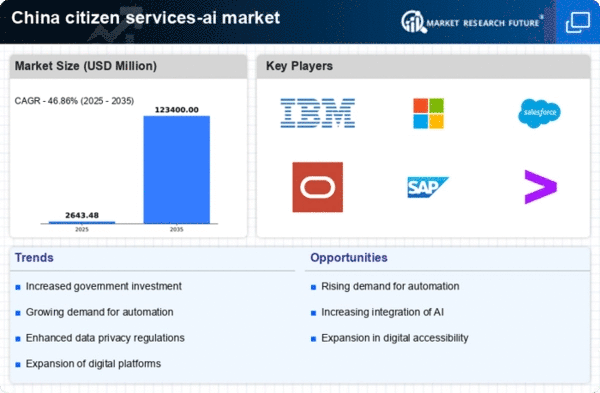Focus on Smart City Initiatives
The push towards smart city initiatives in China is significantly impacting the citizen services-ai market. These initiatives aim to leverage technology to improve urban living conditions and enhance the efficiency of public services. AI plays a crucial role in smart city projects, enabling data-driven decision-making and optimizing resource allocation. For instance, AI applications can analyze traffic patterns to improve transportation systems or manage energy consumption in public buildings. The Chinese government has committed to developing over 500 smart cities by 2030, which is expected to create substantial opportunities for the citizen services-ai market. This focus on smart cities indicates a long-term strategy to integrate AI into everyday public services.
Government Investment in AI Technologies
The citizen services-ai market in China is experiencing a surge in government investment aimed at enhancing public service delivery. The Chinese government has allocated substantial funds, reportedly exceeding $10 billion, to develop AI technologies that streamline administrative processes. This investment is likely to foster innovation and improve efficiency in citizen services, as AI applications can automate routine tasks, thereby reducing operational costs. Furthermore, the government's commitment to AI development aligns with its broader strategy to position China as a leader in technology. This focus on AI is expected to create a robust ecosystem for the citizen services-ai market, encouraging private sector participation and collaboration with public entities.
Advancements in Natural Language Processing
Advancements in natural language processing (NLP) are playing a pivotal role in the evolution of the citizen services-ai market in China. NLP technologies enable machines to understand and respond to human language, facilitating more intuitive interactions between citizens and government services. This capability is particularly crucial in a diverse linguistic landscape, where effective communication is essential for service delivery. The integration of NLP in chatbots and virtual assistants is enhancing user experience, as these tools can provide instant responses to inquiries. As a result, the citizen services-ai market is likely to see increased adoption of NLP solutions, which could improve citizen engagement and satisfaction with public services.
Rising Demand for Efficient Public Services
There is a growing demand for efficient public services among citizens in China, which is significantly influencing the citizen services-ai market. As urbanization accelerates, the population's expectations for quick and effective service delivery have risen. Citizens increasingly seek solutions that reduce wait times and enhance accessibility to government services. This demand is reflected in the increasing adoption of AI-driven platforms that facilitate online service requests and real-time information access. Reports indicate that over 60% of citizens prefer digital interactions with government agencies, suggesting a shift towards AI solutions that can meet these expectations. Consequently, this trend is likely to drive further investment in AI technologies within the citizen services-ai market.
Increased Collaboration between Public and Private Sectors
The citizen services-ai market in China is witnessing increased collaboration between public and private sectors, which is likely to drive innovation and efficiency. Government agencies are increasingly partnering with technology firms to develop AI solutions tailored to public service needs. This collaboration can lead to the sharing of resources, expertise, and data, ultimately enhancing the quality of services provided to citizens. Reports suggest that such partnerships have resulted in the deployment of AI systems that improve service delivery in areas like healthcare and transportation. As these collaborations expand, they are expected to foster a more dynamic citizen services-ai market, encouraging the development of cutting-edge solutions that address the evolving needs of the population.
















